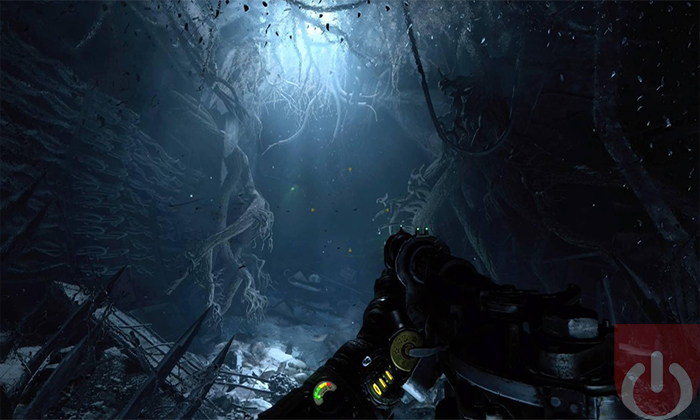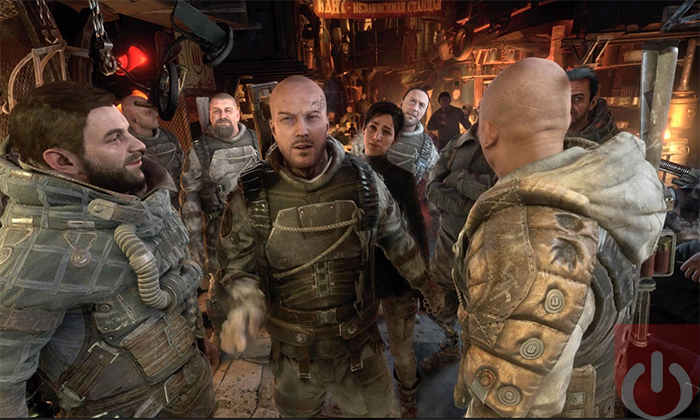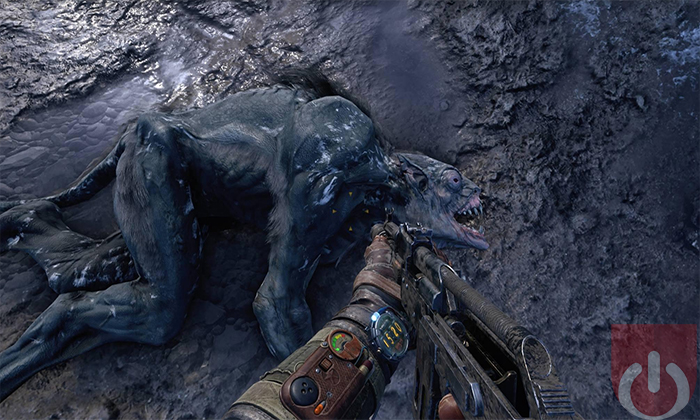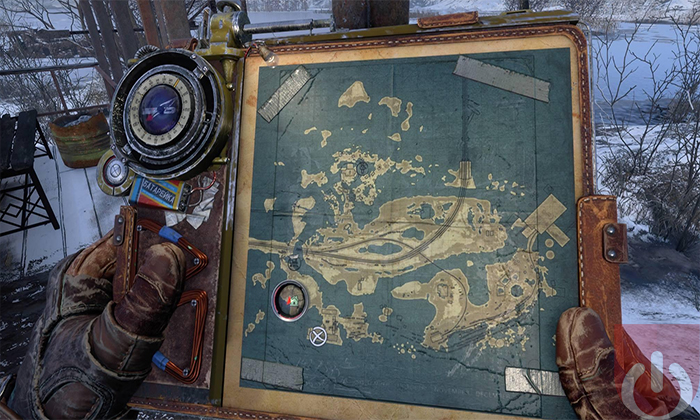Metro Exodus
Working in our field, it’s easy to get comfortable playing and reviewing games from genres we’re a fan of. This is somewhat out of our hands though as games are assigned based on multiple factors. Which is a good thing considering how quickly we’d rush to play the next Mario or Final Fantasy; things would quickly devolve into a scene from the Hunger Games.
Part of it comes from the fact that we’re more knowledgeable about the stuff we enjoy. A fan of shooters might not have a difficult time reviewing Call of Duty or the recently released, Apex Legends. They may find it challenging to review an RPG (if that’s not their cup of tea) though. That said, it’s usually to that person’s benefit to try new things as they’ll come to better understand a particular genre. In some cases, they’ll luck into an invigorating experience that they might have otherwise missed out on. This brings me to Metro Exodus.
At UFG, I tend to stay away from any game that has any horror elements because I just don’t need that stress in my gaming life. In other words, I stayed away from the previous Metro games – I’d only saw people play, read up on it, watched some story videos, etc. So, when we received a review code for Metro Exodus, I didn’t expect our Editor in Chief to pick me to review it. I’m glad he did though. As stressful as my playthrough was, I still enjoyed my time playing 4A Games’ latest title!
The Metro universe is set in a, seemingly, familiar scene. A huge war had engulfed the planet for generations, only to end after several nukes are deployed. The people of Moscow were forced to live in an underground tunnel community with a train system called “Metro”. Our silent protagonist, Artyom, has always felt that there was life beyond the walls of the tunnels they were living in. Most of the people knew that to be true but thought that the only life they’d find were the mutated creatures who hunted them for food. That is until Artyom and his wife stumble upon a discovery that sends them and friends on a quest for truth.
It only takes a few minutes of introduction to understand that this installment is looking to give gamers the same action and suspense as the previous titles, but in a much freer flowing concept. No longer are we confined to the linear tunnels of before as Artyom can explore the outer realms of a post-apocalyptic Russia – complete with gameplay altering time and weather changes – using a steam train called the Aurora (among other means of travel). Previous games in the series provided a radioactive environment. Players would have to contend with gas masks and air filters to ensure they weren’t poisoned. That immersive element is seen here as well, though players (and the main characters) will be happy to know that fresh air is available sans a breathing apparatus.
That’s not to say that the world above ground is safe of course. Once you and your crew leave home in search of an alternative living area, you do end up meeting people who aren’t trying to kill you for your supplies. But those encounters aren’t the norm, considering how nearly everyone and everyTHING is trying to kill you at one point or another. There are multiple factions of enemies from all different walks of earth, including Nazis. No problem – who doesn’t love taking down Nazis? There are also mutants, giant underwater creatures, and flying monstrosities to struggle against. All of which freaked me out once introduced.
Players will need to utilize stealth to bolster their odds of survival. It’s a logical approach when areas are teaming with enemies. I don’t think I was prepared for how much stealth was needed though. From the outside in, this game really does look like a Russian version of a Fallout. Which, Fallout 76 aside, is actually a great compliment to the gameplay style. Having to search seemingly barren landscapes for parts to craft weapons and such, managing limited resources, dealing with locals who may or may not be friendly. All of these things feel similar to that other series. What separates the two series – besides the locations, lore and some gameplay elements – are its enemy encounters. Death can come quick if you aren’t careful.
Some of this has to do with the AI systems, allowing for smarter enemies. The good news is that this works both ways. Take the human enemies for example. 4A made sure to empathize their interactions with one another. As they work together and sharing information, they’ll eventually force you to come out of hiding. The good news is that their level of intelligence can also work in your favor. Some will start to tremble with fear, resulting in them missing their shots, as their teammates die around them. Others might actually surrender after finding multiple bodies strewn about the area. It was if they knew that they couldn’t stop someone who had silently (or nosily) taken out a bunch of their buddies.
Taking down the human enemies using stealth is a no brainer. That should go double for the mutants. Though dealing with them can be tricky. It might make sense to go do a mission at given how easier it would be to sneak up on someone. The downside is that you’ll have a harder time seeing as well. This isn’t a big deal when it comes to the human factions as they’ll act in a manner one would expect. The mutants, on the other hand, seem to have a keen since of your location once alerted. Some of my most trying moments playing Metro Exodus were when something attacked me from the shadows. This of course made it difficult for me to progress through certain sections; I made sure to be wary of bodies of water after I was randomly pulled out of my rowboat.
But that isn’t just what make the mutants frightening. It’s also their ability to adapt to a given situation that freaks me out. For example, there’s a mission early in the game that tasks you with having to help a mechanic escape a tower full of mutants. At one point, I walked up and peeked through a small wall opening to get a shot some of them. You know, to knock off a few before going in guns blazing. I thought I was totally safe given their location to mine, even after the mutant I first targeted had spotted me. I quickly realized how wrong I was. Not only did he come after me, he shifted his body in a way that allowed himself to squeeze through the crack in the wall I was peeking through. In real life, it makes total sense for him to come at me directly. But because I had become so comfortable with video game logic – which would have made him search for an alternate route before giving up, only to return to his predetermined path – I didn’t expect him to try getting through such a narrow passage.
Metro Exodus has a solid plot. The roughly ten-hour campaign is full of entertaining missions. But the smart (sometimes scary) enemies are what provides most of Metro’s thrills. The moments outside of combat are still interesting though, thanks to the game’s lore and 4A’s attention to detail. Whether it’s the diverse environments – Artyom goes from snow covered mountainous regions to flat desert like areas – or the realistic depiction of your cobbled together weapons, there is so much to take in at any given moment. All of it enhances the gameplay. Everything you see in the environment is important thanks to the developer’s linear approach; even when you go about exploring, you’re never too far from the main story. The believability of your weapons helps to sell the game’s combat. That sniper rifle has a sense of weight to it, making that shot that removes a mutant’s head seem that much more powerful.
Metro Exodus is a great example on how to to create the final chapter of a popular series. By not flooding the sandbox with too many options, the game is allowed to flow smoothly from chapter to chapter. There are no meaningless side missions to add fluff, just a well written story with characters you actually care for. At the same time, given the nature of a final game, you’ll still be able to explore larger locations than was seen in previous titles. Essentially, 4A made sure the experience was grand in scope but balanced as to not overstay its welcome. That’s a hard thing to pull off.
If this is the end of a series, then the experience found in Metro Exodus is one heck of a way to close it out. I mean, they got a “I don’t play any sort of horror/zombie solo games” type of gamer to enjoy themselves. That means their longtime fans will certainly do the same!
Gameplay:
9
Metro Exodus is entertaining on multiple levels. And that’s coming from someone who avoids most games with survival horror-like elements.
Graphics:
9
Metro Exodus is one of the best-looking games around. It has some minor issues here and there (on console) but nothing really of note.
Sound:
8
The sound effects, voice acting and soundtrack should be well received.
Replay Value:
6
Fans of the series will definitely want to jump back in once the credits rolled. Given the linear nature of the game, however, a lot of gamers will put away their gas masks as they wait for the inevitable expansion/DLC.
Final Score:
8




